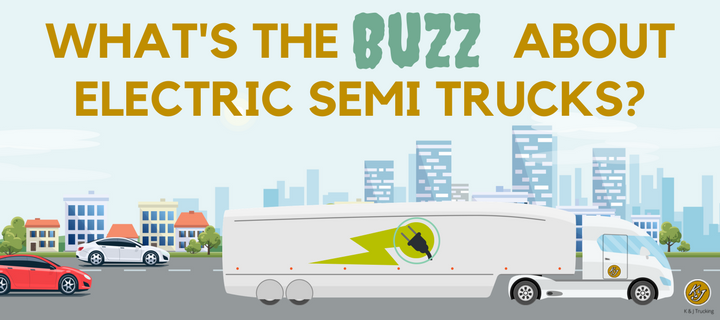What's the Buzz About Electric Semi Trucks?
 In the last few years there has been a lot of buzz about electric trucks, including autonomous trucks. There is hype, and the hype is creating interest. The hype is also creating a little bit of dialogue between competitors.
In the last few years there has been a lot of buzz about electric trucks, including autonomous trucks. There is hype, and the hype is creating interest. The hype is also creating a little bit of dialogue between competitors.
No matter where you fall, whether with Tesla, Nikola or one of the half dozen other companies trying to get in on the electric game, you have to admit, electric trucks are exciting. But are they really going to be the truck of the future?
Rather than simply getting caught up in the excitement, we are taking a hard look at the feasibility of electric trucks. We sat down with K & J's Brad Schipper to hear his thoughts on the future of electric; and he had some great questions.
What is the Weight Capacity?
There are several huge unknowns right now with electric trucks. The first is weight. We don't really know how heavy these trucks are. Recent estimates have suggested they should be able to haul freight of around 28,000 to 32,000 lbs. When you consider that most K & J loads are around 35,000 to 45,000 lbs, that weight difference can make a huge difference in a driver's bottom line.
This could be mitigated if Congress changed weight limits, but until that happens, electric trucks are going to be limited to carrying smaller loads. This could work fine for local or regional carriers who usually tend to run light, or "less than truckload" (LTL), but long-distance carriers may find it harder to navigate financially.
How Long Does a Charge Last?
Another unknown is how long their charge will last, or even how long it takes to fully charge the batteries. Without knowing the details it is hard to speculate how electric trucks could affect the industry. Ideally, charge times would be fairly quick so drivers could stay on the road longer. The longer it takes to charge something, the more it costs you in time. And we all know that time is money.
How Will They Establish the Charging Infrastructure?
The nationwide use of electric trucks would require a large charging infrastructure. Tesla has already worked toward providing this for their electric cars, but they still are far from mainstream. For this to be feasible for trucks, there would need to be a wide network of charging stations. Unfortunately, we don't know what this network would cost, both for implementation and for local communities to supply with electricity. One can imagine that it is likely a large electric load to carry.
What are the Lifecycle Costs?
The big players in the electric truck industry have said that the truck lifecycle will be significantly extended, but we have yet to know specifics. With the potential decrease in freight capacity and unknown charge times, the lifecycle costs need to be pretty impressive to offset other concerns.
How Will Greenhouse Gas Credits Work?
Whether or not they increase weight limits, Congress still has to get involved in deciding how much they will offer in greenhouse gas credits. Will those credits be enough to override the higher cost of the truck and the lower freight capacity?
How Do Other Environmentally Friendly Technologies Compare?
The other side of the coin that could compete with electric is hydrogen engines. Kenworth announced they are currently testing a hydrogen engine. This engine uses hydrogen as the engine propellant, and the byproduct is water! These engines may still have a weight issue because of the need for a container that can hold the extra hydrogen fuel on the truck. It is also a potential explosion risk. But it could still be a viable competitor to electric.
So What Do I Think?
All of this excitement and innovation is really about meeting the demands of emissions mandates. While these mandates are forcing technology to evolve, real world factors still cause limitations. With the current model of using diesel we can go all across the country because we have infrastructure in place to keep our freight moving and not stop unless we want to stop (or are mandated to stop by hours of service rules). That convenience is nice, but we are leaving a big carbon footprint.
It remains to be seen how exactly these new technologies will impact trucking in the future. Most companies believe that we are still 2-4 years away from anything of volume being on the ground so we can test the efficiency.
As a fleet owner, for me this technology isn't currently applicable. The cost of ownership and trying to get the mechanics to where I can use it just doesn't fit for me right now. It is not perfected yet.
Some people have, and will, buy into it before they have the proof that it will be a good long term investment. In fact, if you were talking to me twenty years ago I would probably be even more on board than I am right now. There has been a lot of talk and hype, but no answers yet. And experience tells me that these electric truck manufacturers still have a lot of development to do. For now? We wait and watch.

